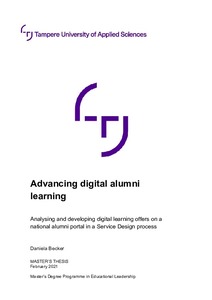Advancing digital alumni learning : analysing and developing digital learning offers on a national alumni portal in a service design process
Becker, Daniela (2021)
Becker, Daniela
2021
All rights reserved. This publication is copyrighted. You may download, display and print it for Your own personal use. Commercial use is prohibited.
Julkaisun pysyvä osoite on
https://urn.fi/URN:NBN:fi:amk-202103173497
https://urn.fi/URN:NBN:fi:amk-202103173497
Tiivistelmä
This thesis looks at digital learning offers for alumni on a national alumni portal as part of the portal’s overall alumni strategy. The Alumniportal Deutschland was introduced as Germany’s national platform and approach to alumni work in 2008. The thesis topic therewith pertains to the broad thematic fields of alumni work and strategies on the one hand and online offers for lifelong learning on the other hand.
As the author, who works for the portal, noticed the rising interest in digital learning during the global Covid-19 pandemic and as she assumes that the digital learning section on the Alumniportal Deutschland still holds potential for development, the decision was made to analyse the learning offers intending to redesign them. The objective was to achieve new digital learning offers that add value to the core users, and at the same time are effective from the providers’ perspective.
The author has chosen to follow a Service Design process to fulfil the service innovation task of the thesis project. Service Design applies design thinking to the innovation and design of services. Eventually, a combination of research and Service Design methods was used to approach the strategic task at hand. The applied methods comprise an online survey, journey maps, a stakeholder analysis, benchmarking, personas, a trend mapping as well as a co-design workshop with users and team members of the Alumniportal Deutschland.
Based on the findings from the research and Service Design methods, the author formulated ten conceptual and practical recommendations for further developing the digital learning offers on the Alumniportal Deutschland in the
future.
Overall, the thesis project has revealed insights that can give guidance when redesigning the digital learning offers on the portal so that they better meet alumni’s needs and expectations and therewith help to build and maintain valuable relationships with existing and future alumni groups. The author assumes that the gained insights cannot only provide strategic direction for the staff of the Alumniportal Deutschland but also could be useful to other providers in the market as well.
As the author, who works for the portal, noticed the rising interest in digital learning during the global Covid-19 pandemic and as she assumes that the digital learning section on the Alumniportal Deutschland still holds potential for development, the decision was made to analyse the learning offers intending to redesign them. The objective was to achieve new digital learning offers that add value to the core users, and at the same time are effective from the providers’ perspective.
The author has chosen to follow a Service Design process to fulfil the service innovation task of the thesis project. Service Design applies design thinking to the innovation and design of services. Eventually, a combination of research and Service Design methods was used to approach the strategic task at hand. The applied methods comprise an online survey, journey maps, a stakeholder analysis, benchmarking, personas, a trend mapping as well as a co-design workshop with users and team members of the Alumniportal Deutschland.
Based on the findings from the research and Service Design methods, the author formulated ten conceptual and practical recommendations for further developing the digital learning offers on the Alumniportal Deutschland in the
future.
Overall, the thesis project has revealed insights that can give guidance when redesigning the digital learning offers on the portal so that they better meet alumni’s needs and expectations and therewith help to build and maintain valuable relationships with existing and future alumni groups. The author assumes that the gained insights cannot only provide strategic direction for the staff of the Alumniportal Deutschland but also could be useful to other providers in the market as well.
